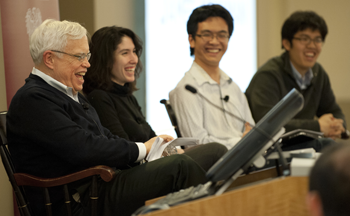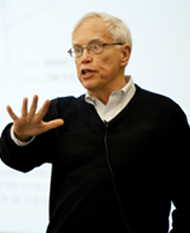Friedman Brown Bag Undergraduate Series
Pizza and Conversation with James Heckman
Feb. 21, 2012
At the first Friedman Forum, more than 100 undergraduates enjoyed first-hand examples of how economists think and address problems from one of the best—2000 Nobel Laureate James J. Heckman
See video of the event (95 min.) »
Heckman, the Henry Schultz Distinguished Service Professor in Economics, was the inaugural speaker in this new series sponsored by the Becker Friedman Institute. The talks are designed to give students in the College access to the best and brightest economists and a sense of the power and scope of economic analysis. Heckman, known for both his theoretical work and empirical research, began by explaining an economist’s tools and approach, then showed how they can be applied to address serious policy issues.
CK Chen, Jin Soo Han, and Maryclare Griffin—three students who work on Heckman’s research projects—led a discussion that roamed over Heckman’s wide-ranging research agenda and achievements. Responding to their questions and more from the audience, he returned to a key theme: why economic analysis matters.
 Professor Heckman shared a laugh with his undergraduate research assistants, Maryclare Griffin, Jin Soo Han, and CK Chen, who moderated the talk.
Professor Heckman shared a laugh with his undergraduate research assistants, Maryclare Griffin, Jin Soo Han, and CK Chen, who moderated the talk.
Asked to explain the difference between statistics that undergraduates learn and the econometrics he uses, Heckman replied, “Most of us [economists] are interested in policy questions: What happens when you change the world in a certain way? Part of that is trying to understand counterfactuals—thinking about the way the world might be, rather than how it is. Economists build tools to test the counterfactuals, the out-of-our experience situations, to try to describe and predict future policies. That involves a completely different activity than purely descriptive statistics.”
Because economists are trying to predict and understand how people choose, behave, and interact, “they developed an entirely different lexicon and framework for analyzing possible outcomes,” Heckman said, integrating a behavioral component that “statisticians and their methods would not be sympathetic to.”
Heckman then guided the audience through examples of selection bias in research and explained the Heckman Correction Model, showing how a bias term is added to equations in economic models to correct for bias.
Much of Heckman’s work in the areas of early childhood education programs, human development, and life cycle skill formation involves estimating the impact of noncognitive abilities. Heckman said a very active research area is trying to measure how subjective traits such as time preference, personality, risk aversion, labor supply preferences and conscientiousness influence human achievement.
“People are trying to understand how psychology measures and parameters diverge from standard econometric measures. We think at least parts of those traits are something different than pure active intelligence. More recently, there’s been a focus on ambiguity aversion, when you really don’t know the parameters of the economy. A whole set of new traits creeping in, like trust, altruism, and even reciprocity and the idea of fairness.
“Psychologists like to think these traits are inherent; they see them show up on a survey or personality inventory. Enter the economists; what we see is that every one of these traits is a function of individual behavior under certain circumstances. So you have to calibrate your measures very carefully.”
Heckman went on to give brief but intriguing highlights of longstanding research interests like the Perry Preschool Program study and new areas like epigenetics. This field studies changes in genetic expression influenced by environment or experience, not by a change in the actual genetic sequence.
“What we’re beginning to understand is that experience in life will actually change how genes express themselves,” Heckman said. Studies of rhesus monkeys have shown that putting the animals in circumstances mimicking poverty affect gene expression in 22 percent of their genes. Many studies have looked at what happens when young primates are deprived of maternal or social attention. Econometrics offers the tools to study for the first time the lifetime health outcomes of these animals. Studies show monkeys raised by surrogates are not only shy and withdrawn, but also have significantly more illness, Heckman said.
For students in the crowd interested in medical school, this research has implications for not just treating but preventing disease, Heckman noted. “Economists are coming in and showing how we might change the trajectory of health.
“So why am I doing this? It turns out that poverty really gets under the skin. [Epigenetics] is a new avenue toward a deeper understanding of what poverty is all about. Can we reverse it? It’s more than suggestive that something is going on here.”
Heckman said that as a child of the 1960s, he has long been interested in poverty, racial inequality, and achievement gaps; those interests have shaped his research agenda. Research can be hard work subject to painful criticism; it’s less work when pursuing something that truly interests you, he advised.
“If something grabs you, no matter what it is, you should probably follow it. To try to understand something beyond a shadow of a doubt, you go through things that can be very painful, but when you reach some glimmer of conclusion, there’s an ah-ha moment. The reward is on this other side when it makes a difference. I don’t mean just when your work is on the front page, but it leads to true understanding."

